Kavanaugh One Step Closer To Confirmation
Judge Brett Kavanaugh reportedly told Senator Susan Collins that he considers Roe v. Wade "settled law." This will likely be enough to get her support and that of another holdout Republican Senator.
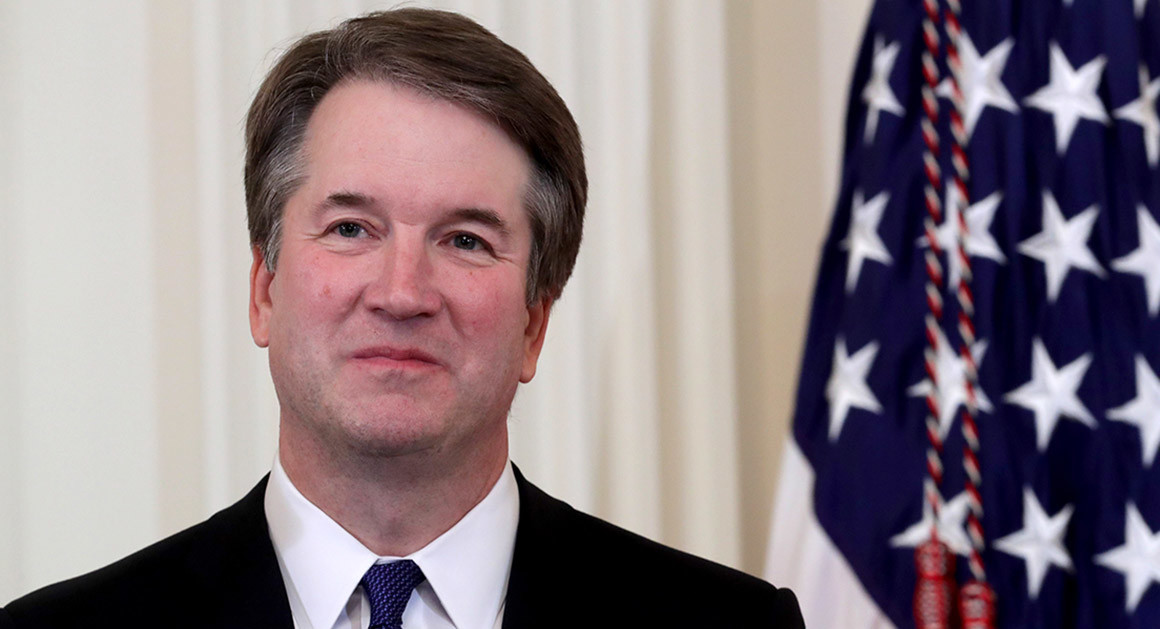
While Washington continues to observe the twin impact of the Manafort conviction and the Michael Cohen guilty plea, there was some news on the Brett Kavanaugh front that likely means that whatever hurdle he might have potentially faced on the road to confirmation has been eliminated. Specifically, after meeting with the Judge earlier this week, Maine Senator Susan Collins, who is one of the few Senate Republicans who remains on the fence regarding the nomination, said that Kavanaugh told her that he considers Roe v. Wade to be “settled law”:
WASHINGTON — Judge Brett M. Kavanaugh’s views on abortion took center stage in the Senate on Tuesday after he assured a key Republican senator that he believed the 1973 Roe v. Wade decision was “settled law” — a comment that Democrats and abortion rights advocates derided as a meaningless dodge.
Emerging from a more than two-hour “courtesy visit” with Judge Kavanaugh, President Trump’s Supreme Court nominee, Senator Susan Collins of Maine said they had discussed abortion cases “at length,” and that he told her he agreed with Chief Justice John G. Roberts Jr., who told senators during his 2005 confirmation hearings that he regarded Roe as “settled law.” Ms. Collins later said she was heartened by the statement.
Ms. Collins and Senator Lisa Murkowski of Alaska are two Republican backers of abortion rights, and both say they are undecided on Judge Kavanaugh. Their votes are critical to his confirmation. The term “settled law” refers to a precedent that is entitled to respect, and does not necessarily indicate that precedent cannot be limited or overturned.
Ms. Collins’s statement on the matter may say less about Judge Kavanaugh’s views on abortion than her ultimate vote, which appears to be leaning toward “yes.” She had already called him a “clearly” qualified nominee. The judge’s confirmation hearings are set to begin on Sept. 4, with a confirmation vote possible before the end of next month.
Democrats immediately pounced on the “settled law” construction, saying it is a standard phrase employed to duck the real question: whether Roe was correctly decided.
“Let’s be clear; this is not as simple as Judge Kavanaugh saying that Roe is settled law,” Senator Chuck Schumer of New York, the minority leader, told reporters. “Everything the Supreme Court decides is settled law until it unsettles it. Saying a case is settled law is not the same thing as saying a case was correctly decided.”
Mr. Schumer, who has said he will oppose Judge Kavanaugh’s confirmation, also met with him on Tuesday during an hour-and-a-half session that, by the senator’s account, was cordial but not particularly revealing.
Mr. Schumer said he asked numerous questions — including whether Judge Kavanaugh believed Roe was correctly decided, whether he believed the Affordable Care Act was constitutional and whether a president should have to comply with a subpoena — and that the judge repeatedly refused to answer.
“Can’t talk about a case that would come before me, can’t talk about hypotheticals,” a frustrated-sounding Mr. Schumer said, relaying Judge Kavanaugh’s words. “I said, ‘Well, then you can’t talk about just about anything.'”
Judge Kavanaugh’s views on abortion have raised intense concern among abortion rights advocates, in part because of a dissent he wrote in a 2017 case, Garza v. Hargan, that drew widespread attention last fall. Ms. Collins said she talked to Judge Kavanaugh “at length” about the Garza case — the only abortion case in which he has rendered a decision.
In that decision, the United States Court of Appeals for the District of Columbia Circuit, on which Judge Kavanaugh serves, voted to allow an undocumented 17-year-old in immigration detention to seek an abortion without delay; the Trump administration had wanted to first transfer her to an adult sponsor for guidance.
In his dissent, Judge Kavanaugh wrote that while the appeals court was bound to obey Supreme Court rulings that said the Constitution protects a woman’s right to choose an abortion, those precedents nonetheless permit the government to apply “reasonable regulations that do not impose an undue burden.”
Ms. Collins has previously said that she will vote against any nominee who “demonstrates hostility” to Roe. In her meeting with Judge Kavanaugh, Ms. Collins said, “we talked at great length about precedent and the application of stare decisis” — the legal principle of standing by precedent — “to abortion cases.”
“We talked about whether he considered Roe to be settled law; he said that he agreed with what Justice Roberts said at his nomination hearing, in which he said that it was settled law,” she added.
Kavanaugh’s answer obviously isn’t going to satisfy most Democrats, nor will it satisfy hardcore abortion rights advocates who have been saying virtually from the moment that Kavanaugh’s name was announced that confirming him would mean the eventual end of the precedent set down in Roe v. Wade, reaffirmed in Planned Parenthood v. Casey, and essentially reaffirmed most recently in the Supreme Court’s 2016 decision in Whole Women’s Health v. Hellerstadt in which the Court struck down a Texas law that purported to be a neutral regulation of medical facilities but which had the impact of putting many abortion clinics out of business. Those groups, however, and the Democratic Senators who support them were never really on the table when it comes to the Kavanaugh nomination. For our purposes, the issues relating to abortion and the Kavanaugh nomination have been aimed solely at two Republican Senators, Collins and Alaska Senator Lisa Murkowski, both of whom have said that they would be inclined to oppose a nominee who would overturn the Court’s ruling as set down in Roe and its progeny. While Collins continued to say after the meeting with Kavanaugh that she remained undecided on the nomination, it seems likely that the “settled law” answer will be sufficient for her and Murkowski to justify a vote for Kavanaugh just as she voted for Chief Justice Roberts, Justice Alito, and Justice Gorsuch, all of whom gave essentially the same answer to the question when it was posed to them. If that’s the case, then Kavanaugh will be affirmed even if no Democrats vote in favor of his confirmation, although it is likely we’ll see at least three Democrats — Joe Manchin, Joe Donnelly, and Heidi Heitkamp — cross the aisle just as they did in the case of the Gorsuch nomination.
To be frank about it, the odds have always been in favor of both Collins and Murkowski voting in favor of Kavanaugh. Even before he was named by President Trump, there were reports that both Senators had been telling the White House behind the scenes that Kavanaugh was the kind of nominee that they would be able to support. These statements came notwithstanding the fact that both Senators were no doubt well aware of the Judge’s previous history, including his recent opinion in the case involving the pregnant teenaged illegal immigrant seeking an abortion noted in the article linked above. Given that, the idea that they were likely to oppose Kavanaugh when they had been among those recommending him to the White House.
As for Senator Schumer’s complaints about the outcome of his meeting with Kavanaugh, I would suggest that those complaints are essentially nonsense. As previous nominees dating all the way back to Justice Ruth Bader Ginsburg’s nomination hearing in 1993 have repeatedly told Senators in the course of their confirmation hearings, it is entirely inappropriate for a Judge to comment on the legal or factual merit of a case that might come before them on the bench. Even if Roe, Casey, and, Women’s Whole Health are seen as settled law, it is inevitable that cases involving the issues involved in those cases would come before Kavanaugh either as a Supreme Court Justice or as a Judge on the D.C. Circuit Court of Appeals in the event he isn’t confirmed to the Supreme Court. Given that, it would be entirely inappropriate for him to comment directly on those cases, or on any pending cases that may implicate those cases or other cases that might come before him. Senator Schumer may not like that answer, but under the applicable ethical rules that Judges are required to adhere to, it is the only appropriate answer that Kavanaugh can give.
In any case, given his responses to Collins, it seems clear that Kavanaugh will be confirmed. It will be a bumpy road, no doubt, and Democrats will be vociferous in their opposition, but the outcome seems assured.

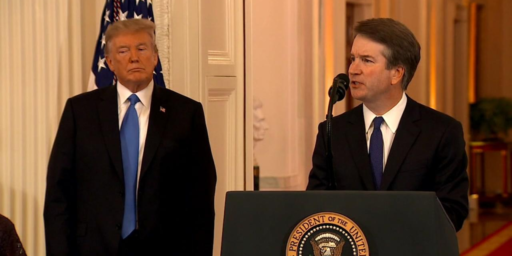
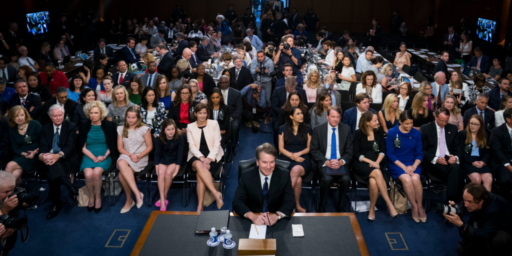
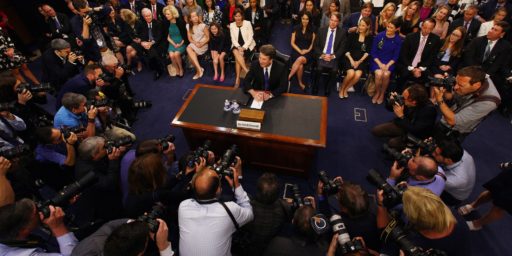
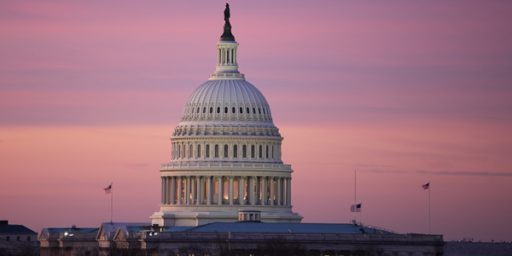
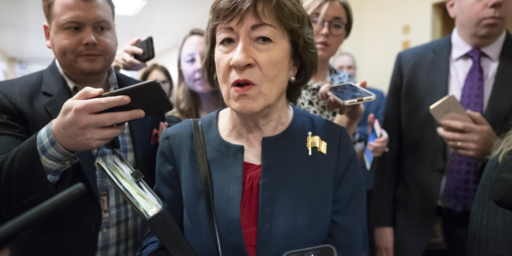
And Senator Collins will be shocked, yes shocked! when Kavanugh votes to overturn Roe v. Wade.
Of course Kavanugh will be confirmed, that was always obvious. And of course Collins and Murkowski were always going to vote for him, that was obvious to anyone who has paid any attention to their records. The only question was what rhetoric they would find to justify the decision that they had already made.
There are credible allegations that Kavanaugh perjured himself in his last confirmation hearing — if he is going to be stopped, I suspect that would be the thing that stops him.
But, then he is just going to be replaced by the next name down the list.
It might also be the thing that causes him to to be removed from the court, later on. If the stars align just right. So, I want the Democrats to hit him hard on this, and get him to repeat any lies if possible. On the court and potentially impeachable is probably the best we can hope for.
Kamala Harris, on Twitter about two hours ago:
Sen. Richard Blumenthal on the same subject:
With the pose-off in full effect, confirmation is all but assured.
Susan Collins will be the next David Boren.
@Kari Q:
Alternatively, it might well be that Kavanaugh does think that Roe vs Wade is settled, which will cause a number of GOP senators to refuse to support him. Its not like the GOP hasn’t refused GOP Presidents candidates in the past for not being conservative enough (ie Harriet Miers).
@Andre Kenji de Sousa: I can’t say much about Boren, I barely remember him, but I think Collins is a typical republican liar. I read somewhere months ago she is planning to run for governor of Maine. If she does I hope she sinks to the bottom like whale sh!te and stays there the rest of her life.
@James Pearce: Was anything Harris and Blumenthal wrote not true? Is there some other course of action you think they should have taken…
@An Interested Party: I think it’s true that Trump is, at this point, basically an unindicted co-conspirator.
But I also think the case the Dems are making on postponing Kavanaugh is bogus. What’s a guy to do?
@Mr. Prosser:
Boren voted for Clarence Thomas. Anita Hill was from Oklahoma, Boren was attacked by local newspapers and retired a few years later. I think that people forget that most Democrats that voted for Clarence Thomas would pay somekind of political price later and that Collins is fighting with History here.
@James Pearce:
The problem is that Democrats are in the minority. On the other hand a SC Justice holds enormous power and they stay there basically forever. You need proper vetting of any nominee.
(That’s something that Brazilians learned in the worst way possible).
@James Pearce: What have they got to lose by postponing this as long as possible…